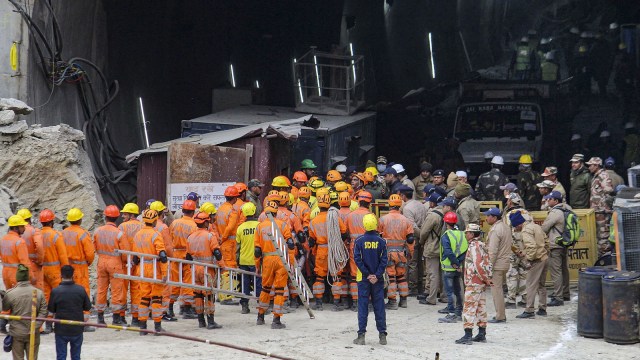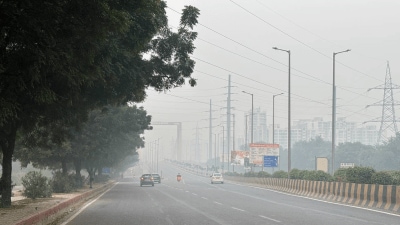Uttarakhand tunnel rescue operation | The dig: 400 hrs, dozen agencies, Govts on ground, in the backroom
At least 652 government employees were deployed in the rescue operation that lasted 17 days.
 NDRF and other rescue workers at the tunnel on Tuesday. (PTI)
NDRF and other rescue workers at the tunnel on Tuesday. (PTI) A dozen agencies from the state and the Centre, regular coordination between the backroom and the ground, and experts from myriad fields collaborating to solve a single puzzle — that’s what it took for rescuers to get 41 men out from Uttarkashi tunnel after 400 hours.
At least 652 government employees were deployed in the rescue operation that lasted 17 days. These included 189 from the police department, 106 from the health department, 77 from the Indo Tibetan Border Police, 62 from the National Disaster Response Force, 39 from the State Disaster Response Force, 46 from Jal Sansthan Uttarkashi, 32 from the electricity department, and 38 from the Border Roads Organisation.
According to Bhaskar Khulbe, a former adviser to the Prime Minister’s Office and Officer on Special Duty to the Uttarakhand tourism department, if one were to include independent workers and private company employees, the number of those who contributed to the operation would cross 1,000.
Uttarakhand Chief Minister Pushkar Singh Dhami said they had approached every possible expert not just in India, but also abroad, including officials involved in the 2018 Thai cave rescue. Union Minister Nitin Gadkari and MoS General (retd) V K Singh were among those who visited the site to take stock of the situation.
According to officials, since the dig from the mouth of the tunnel proved more complex than was initially anticipated, rescuers had been working on five simultaneous plans to get to the men. Each was being handled by separate agencies, each of whom brought a different set of skills to the table.
 Ambulances carrying workers trapped in the Silkyara-Barkot tunnel in Uttarakhand leave after the rescue operation completes on Tuesday, November 28. (Express photo by Chitral Khambhati)
Ambulances carrying workers trapped in the Silkyara-Barkot tunnel in Uttarakhand leave after the rescue operation completes on Tuesday, November 28. (Express photo by Chitral Khambhati)
These included the NDRF, SDRF, BRO, National Highways & Infrastructure Development Corporation Ltd, Navayuga, Oil and Natural Gas Corporation, Tehri Hydro Development Corporation, Satluj Jal Vidyut Nigam, Rail Vikas Nigam Limited, Trenchless Engineering Works, as well as the state and district authorities, and the Army and Air Force.
The rescued workers are being kept under medical observation for now. According to medical experts, besides exhaustion, dehydration, nutritional deficiencies and infections, the biggest concern is likely to be post-traumatic stress disorder (PTSD), requiring careful monitoring in the coming days.
Then there were the countless unnamed heroes — police personnel who stood guard round the clock; cooks who prepared regular meals for rescuers; drivers who worked overtime to ensure equipment reached when it was supposed to. To ensure everyone had a place to rest and recuperate, special arrangements were made by the administration at the site.
Officials from the Prime Minister’s Office were also involved in the operation — from Deputy Secretary Mangesh Ghildiyal to Principal Secretary to the PM, Dr P K Mishra — keeping tabs on every development, big or small.
According to one source: “A coordination meeting with all agencies working at the site was chaired by the Principal Secretary to the PM on November 20, wherein heads of organisations were instructed to monitor the operations personally on an hourly basis.”
It is at this meeting that instructions went out to ensure a green corridor for all equipment and machinery meant to be taken to Uttarkashi from across the country.







